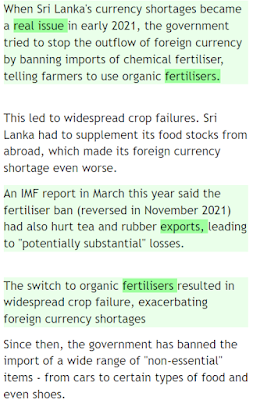The BBC has spoken. Marco Silva, the corporation's Climate Change Disinformation Specialist, has ruled that claims on social media and from “various right-wing US and UK outlets that green policies” - in the form of the Rajapaksa government's 2021 seven-month ban on imports of chemical fertilisers, pesticides and herbicides - caused the collapse of the Sri Lankan economy are FALSE.
If put like that, it's obviously false. Lots of factors contributed to the collapse. The question is did this move to promote organic farming play its significant part too?
It's a peculiar article. As well as its line-up of experts, claiming it wasn't a sincere policy and that the problem with it was that it was brought in too quickly, you get those little words like 'just' doing their work of nudging:
The government dropped the policy, just seven months after introducing it, following widespread protests.
But seven months of a complete ban on the imports of chemical fertilisers, pesticides and herbicides is hardly a short period of time for such a drastic policy, is it? And note the use of the word 'old' here:
But this week, as the presidential palace was stormed, many were quick to blame this old policy.
It's not that old. It ended just over half a year ago and had a major impact on the entire growing season in 2021. And half way through you get this:
And while banning chemical fertilisers indisputably hurt the economy, experts say several other factors contributed.
So if the ban indisputably hurt the economy and was a factor that contributed to the collapse, then how much did it contribute?
Isn't this Reality Check a spot of BBC greenwashing?
Here's what the BBC wrote about it in May under the headline Sri Lanka: Why is the country in an economic crisis?:

No comments:
Post a Comment
Note: only a member of this blog may post a comment.